Practical Applicability of Germination Index Assessed by Logistic Models
IF 0.9
4区 农林科学
Q3 ECOLOGY
引用次数: 4
Abstract
ABSTRACT Sewage sludge management is a major challenge in environmental protection. Composting is an organic waste treatment method that is cost effective and leads to resource recovery. Composting is considered an environmentally and agriculturally friendly method of sewage sludge utilisation. The objective of this study was to evaluate maturity of three composts prepared on the basis of sewage sludge mixed with structure-forming waste materials, such as pine bark, sawdust and wheat straw. The germination index (GI) was used to assess the maturity and phytotoxicity of composts at particular composting stages (initial, mesophilic, thermophilic, cooling, maturation). Cress seeds were used to determine the GI. The logistic model, which belongs to a broad class of generalized linear models, was used to analyze experimental data. Using this model the interesting probabilities (from the point of view of the experimenter) for the occurrence of a specific root length were determined. In addition, a model was constructed providing a dependence of probability on temperature. This work indicates a marked dependence between root length produced by cress seeds and the temperature of the composting process, which was closely related to the GI values. The longest plant roots, similarly as the highest GI values, were found at the lower temperature, which took place at the beginning and at the end of the composting process. Our findings suggest that the practical applicability of GI in the evaluation of compost maturity is limited. Additionally, the role of additional wastes being structure-forming agents in composted mixtures with sewage sludge was stressed as a sorption matrix for harmful substances released from sewage sludge.Logistic模型评价发芽指数的实用性
污泥管理是环境保护面临的重大挑战。堆肥是一种有机废物处理方法,具有成本效益,并导致资源回收。堆肥被认为是一种对环境和农业友好的污水污泥利用方法。本研究以污水污泥为原料,与松皮、木屑、麦秸等结构性废弃物混合制备三种堆肥,对其成熟度进行评价。采用萌发指数(GI)评价堆肥在不同阶段(初熟、中温、嗜热、冷却、成熟)的成熟度和植物毒性。用水芹籽测定GI。采用logistic模型对实验数据进行分析,logistic模型属于广义线性模型的一大类。使用这个模型,确定了出现特定根长度的有趣概率(从实验者的角度来看)。此外,还建立了概率随温度变化的模型。本研究表明,水芹种子的根长与堆肥过程的温度有显著的相关性,且与GI值密切相关。在堆肥过程开始和结束的较低温度下,植物根系最长,GI值最高。我们的研究结果表明,GI在堆肥成熟度评价中的实际适用性是有限的。此外,在与污水污泥混合的堆肥混合物中,附加废物作为结构形成剂的作用被强调为污水污泥释放的有害物质的吸附基质。
本文章由计算机程序翻译,如有差异,请以英文原文为准。
求助全文
约1分钟内获得全文
求助全文
来源期刊

Compost Science & Utilization
农林科学-生态学
CiteScore
4.10
自引率
0.00%
发文量
0
审稿时长
>36 weeks
期刊介绍:
4 issues per year
Compost Science & Utilization is currently abstracted/indexed in: CABI Agriculture & Environment Abstracts, CSA Biotechnology and Environmental Engineering Abstracts, EBSCOhost Abstracts, Elsevier Compendex and GEOBASE Abstracts, PubMed, ProQuest Science Abstracts, and Thomson Reuters Biological Abstracts and Science Citation Index
 求助内容:
求助内容: 应助结果提醒方式:
应助结果提醒方式:


